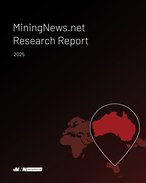This article is 7 years old. Images might not display.
Thick said the company’s A$400 million lithium hydroxide plant in Kwinana won’t be enough to meet demand.
“We’re really excited to be in an industry where demand is strong and outstrips supply,” Thick told the AMEC Convention in Perth yesterday.
“The supply/demand curve is out of whack at the moment.”
Thick described lithium hydroxide as the new “go-to product”, with 40,000 tonnes of hydroxide making up the total global production of lithium carbonate equivalent last year.
Tianqi forecasts that hydroxide demand will reach 150,000t per annum by 2020.
The company’s Kwinana plant, which is under construction, will produce 24,000tpa.
“We probably need three or four more plants like ours just to meet the needs of the next two or three years,” Thick said.
Tianqi already has two hydroxide plants in China.
“World demand requires at least a third one, maybe even a fourth and fifth,” Thick said.
According to Thick, the decision to build in WA was more than just about being closer to Tianqi’s 50%-owned Greenbushes mine.
“We had strong demand from customers for diversification of supply,” he said.
Thick said the investment by a Chinese company into a manufacturing facility was unprecedented in Western Australia.
“It’s a great environment to be building a company and a plant,” he said.
“It will be the largest lithium plant in the world, it will produce the highest quality product, and it will be fully automated, which is also a first.
“It’s really quite ground-breaking for WA.”
The plant is due to be completed by the end of 2018.
“We’re very optimistic this plant will be on time and on schedule,” Thick said.
In March, Tianqi and its Greenbushes co-owner Albemarle Corporation approved a $320 million expansion of the mine, which will see capacity more than double to 165,000tpa by 2021.
Commissioning of the expansion is expected to begin in the June quarter of 2019, coinciding with the start of production from Kwinana.
Kwinana was designed to be expandable.
“We can double capacity of this facility very quickly and we’ll be looking at that as an option,” he said.
But Thick said there was scope to go further downstream in WA, making it a global hub.
“I know our partners at Greenbushes are considering building their own plant,” he said.
“If you get two or three investments in WA, we suddenly become very dominant globally.”























